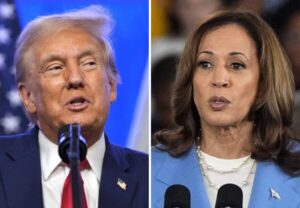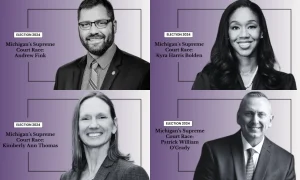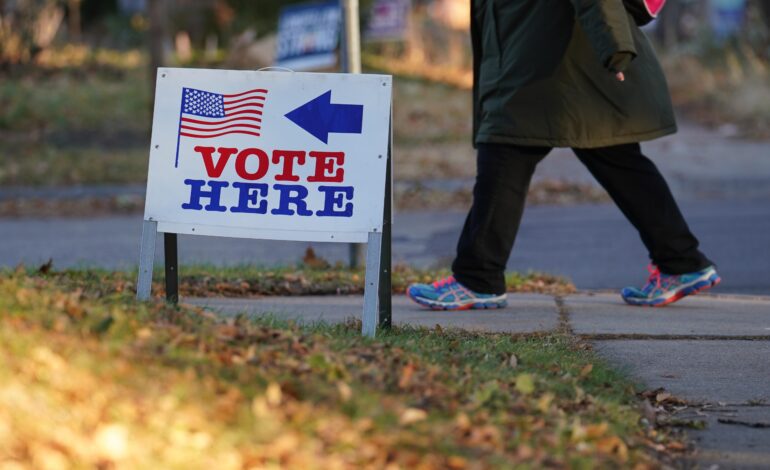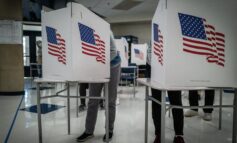With the early in-person voting beginning across the state, the countdown to the November 5 elections has started, where millions of voters will head to the polls to cast their votes in dozens of local and national races, including the congressional and presidential ones.
In this report, we review the statewide races in Michigan in which Arab and Muslim voters will play a decisive role, including the presidential one.
It’s noteworthy that Arabs and Muslims make up more than 5 percent of Michigan’s population, a proportion significant enough to tip the balance in various closely contested races.
In the race to the White House between the Democratic candidate, Vice President Kamala Harris, and the Republican candidate, former President Donald Trump, The Arab American News recommends against voting for either of them due to their complicit stances on Israel’s genocidal war on Gaza and the ongoing aggression against Lebanon.
By depriving these two candidates of tens of thousands of votes, the balance of power could shift, sending a message to the loser about the importance of the Arab vote and the need to appeal to it in future elections.
In addition to Harris and Trump, Michigan’s ballot will include six other presidential candidates: Jill Stein (Green Party), Oliver Chase (Libertarian Party), Randall Terry (U.S. Taxpayers Party), Cornel West (Independent), Joseph Kishore (Independent) and Robert F. Kennedy (Natural Law Party), whose name remains on the ballot despite his withdrawal from the race and endorsement of Trump.

U.S. Senate race: Michigan is witnessing one of the fiercest electoral battles for control of the U.S. Senate, with Democratic candidate Elissa Slotkin and Republican candidate Mike Rogers vying for one of the state’s two Senate seats. The Senate consists of 100 members, with two senators per state as outlined in the U.S. Constitution.
As with the presidential race, The Arab American News recommends against voting for either Slotkin or Rogers due to their unlimited support for Israel and their warmongering history.
The two candidates, who are spending tens of millions of dollars, are competing to succeed Democratic U.S. Senator Debbie Stabenow, who decided not to seek re-election after holding the seat for the last 24 years.
Alongside Slotkin, currently a U.S. representative, and former U.S. Rep. Rogers, four other candidates are vying to succeed Stabenow: Joseph Solis-Mullen (Libertarian Party), Dave Stein (U.S. Taxpayers Party), Douglas Marsh (Green Party) and Doug Dern (Natural Law Party).
The race to fill Stabenow’s seat is of great importance in the context of the partisan struggle for control of the U.S. Senate, which is currently under Democratic control (51-49).
Democrats will need to retain Stabenow’s seat to maintain their current majority in the Senate. The Democratic Party has controlled both of Michigan’s U.S. Senate seats since the 2000 elections, when Stabenow defeated then-Republican U.S. Senator Spencer Abraham.

Republican Mike Rogers and Democrat Elissa Slotkin. – File photos
Michigan Supreme Court race: The Michigan Supreme Court consists of seven seats, with members elected for eight-year terms. This election cycle, Michigan voters will be asked to vote for two seats: one for a partial term and one for a full term.
Although judicial races are considered nonpartisan, candidates are nominated by political parties.
In the race for the partial four-year term, incumbent Justice Kyra Harris Bolden, who was appointed by Democratic Governor Whitmer in early 2022, is facing Patrick William O’Grady, who was nominated by the Michigan Republican Party and is currently a judge on Michigan’s 15th Circuit Court.
The Arab American News encourages voting for Bolden, who has garnered support from the Arab American Political Action Committee (AAPAC) as well.
In the race for the open eight-year term, Democratic candidate and University of Michigan law professor Kimberly Thomas is running against Andrew Fink, a Republican member of the Michigan House of Representatives for the 35th District.
While Bolden seeks to complete an additional four years, Thomas aims to expand the Democratic majority in the state’s highest court by capturing the seat currently held by conservative Justice David Viviano, who decided to retire at the end of his term early next year.
Currently, the Supreme Court consists of four liberal-leaning justices (nominated by the Democratic Party) and three conservative-leaning justices (nominated by the Republican Party).

2024 Michigan Supreme Court race
Michigan State Board of Education race: The elections also feature an open competition for two seats on the Michigan State Board of Education, which oversees the state’s educational system and consists of eight members.
Democratic candidates include former State Rep. Adam Zemke and former Detroit Public Schools administrator Theodore Jones, who will face off against incumbent Republican board members Tom McMillin and Nikki Snyder.
If the Republican members lose, all board members would be Democrats.
The race also includes candidates from the U.S. Taxpayers Party, one candidate from the Libertarian Party and one candidate from the Working Class Party.

(From left) Michigan State Board of Education candidates Tom McMillin (R), Nikki Snyder (R), Adam Zemke (D), Theodore Jones (D), and Scott Boman (L). U.S. Taxpayers Party candidates Ted Gerrard and Christine Schwartz and Working Class Party candidate Mary Anne Hering are not pictured. – Photos candidate’s campaign via WDET
University boards races: Michigan has three universities whose boards are directly elected by the state’s residents for eight-year terms: the University of Michigan, Michigan State University and Wayne State University.
- University of Michigan: In the race for two seats on the University of Michigan Board of Regents, Democrats Denise Ilitch (incumbent) and Shauna Ryder Diggs (former member) are running against Republican challengers Carl Myers and Sevag Vartnian, as well as Libertarian Party candidate Andrew Chadderdon and U.S. Taxpayers Party candidate Donna Oetman. Democrats currently hold a 6-2 majority.
- Michigan State University: In the race for two seats on the Michigan State University Board of Trustees, Democratic candidates include former State Rep. Thomas Stallworth III and former Ingham County Commissioner Rebecca Bahar-Cook, competing against Republican candidates Mike Palo and former Novi City Council member Julie Maday. The race also includes two U.S. Taxpayers Party candidates, one Libertarian Party candidate and one Green Party candidate. Democrats hold a 7-1 majority.
- Wayne State University: Democratic candidates Mark Gaffney (incumbent) and pharmacist Rasha Demashkieh, who has the endorsement of The Arab American News, are running for two seats on the Wayne State University Board of Governors against Republican candidates businessman Sunny Reddy and Detroit physician Michael Busuit (incumbent). The race also includes five other candidates from the Libertarian Party, U.S. Taxpayers Party, Working Class Party, Natural Law Party and the Green Party, which has nominated Arab American physician Sami Makhoul. Democrats control the Board of Governors with a 6-2 majority.
————————————————————————————
Key deadlines for registration and voting in Michigan
Don’t miss the opportunity to vote!
Although last Monday was the last day in Michigan to register voters online or by mail for the November 5 election, there is still a chance for eligible citizens to register by visiting their local clerk’s office in the county or city where they reside, provided they can show proof of residence.
Thanks to changes made to Michigan’s election laws, in-person registration will remain available at clerk offices until the polls close at 8 p.m. on Election Day.
Registering at the Clerk’s Office
To have the opportunity to vote in the upcoming election, unregistered residents must visit their local clerk’s office in person, bringing one of the approved documents for proof of residence. If an individual is unsure of their local clerk’s office location, they can find it by visiting Michigan.gov/vote.
To prove residency, one must show a driver’s license or state-issued ID, a current utility bill, a bank statement, a paycheck, a government check or any other government document addressed to the person.
At the local clerk’s office, one can register to vote and request an absentee ballot up until the day before the election.
Eligibility to vote in Michigan
To register to vote in Michigan, a person must be a U.S. citizen, a resident of the state for at least 30 days by the time of voting, be at least 18-years-old by Election Day and not be incarcerated.
If someone is unsure whether they are already registered to vote, they can check at michigan.gov/vote.
Important dates
- Saturday, October 26: Early in-person voting begins across Michigan at designated locations in each city or town.
- Friday, November 1, 5 p.m.: Deadline to request an absentee ballot online or by mail.
- Sunday, November 3: Last day for early in-person voting across Michigan.
- Monday, November 4, 4 p.m.: Deadline to request an absentee ballot in person at a local clerk’s office.
- Tuesday, November 5: Polls will be open at all voting centers from 7 a.m. to 8 p.m. Voters can also request an absentee ballot from their local clerk’s office until the polls close, provided they are already registered to vote.
– CORRECTION: A previous version of this article incorrectly stated that it was produced as part of the 2024 Elections Reporting Grant Program, organized by the Center for Community Media and funded by the Jonathan Logan Family Foundation, the MacArthur Foundation, and the Tow Foundation.






Leave a Reply